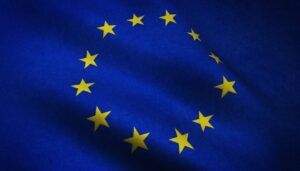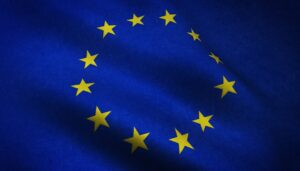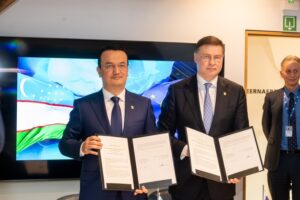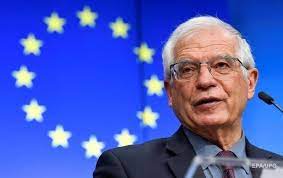
Consumer prices in Italy, harmonized with European Union standards, rose by 2.1% year-on-year in March, according to preliminary data from the Istat statistical agency. The rate of increase accelerated from 1.7% in February and became the highest in a year and a half (since September 2023).
Analysts on average had forecast a 1.9% rise this month, according to Trading Economics,
The increase in consumer prices in March compared to the previous month amounted to 1.6% (after an increase of 0.1% in February).
Consumer prices in Italy, calculated according to local standards, increased by 2% yoy (also the highest in a year and a half) after rising by 1.6% in February.
Energy prices went up by 1.3%, tobacco products by 4.6%, food by 3.3%, and communication services by 0.8%.
Core inflation (excluding volatile energy and food prices) amounted to 1.7% in annual terms this month.
http://relocation.com.ua/v-italii-v-berezni-pryskorylasia-inflia/

The European Union has expanded the sanctions list against Belarus, including seven legal entities and 25 individuals.
The corresponding decision of the Council of Europe was published in the Official Journal of the EU on Thursday.
The list of sanctioned companies includes: Integral, the managing company of Integral Holding (a major manufacturer of microelectronics), Planar (a major manufacturer of microelectronics, including military purposes), the state enterprise Plant of Precision Electromechanics (part of the State Military Industrial Committee of Belarus, according to the EU, produces, including ballistic missiles).
The list also includes SE “Belarusian Lotteries” (part of the Department of Presidential Administration of Belarus, has the exclusive right to organize lotteries), the company “Belbet” (online casino, managed by SE “Belarusian Lotteries”), LLC “Ridotto” (develops applications for online games), LLC “Tsybulka-Bel” (agricultural company, according to the EU, owned by German citizen Jorg Dornau).
The sanctions were also imposed on Sergei Avakov (CEO of Planar), Yuri Chorny (director of the Plant of Precision Electromechanics), Dmitri Shvedko (entrepreneur, majority shareholder and director of Ridotto), Mikhail Denisenko (director of the State Enterprise Belarusian Lotteries).
In addition, sanctions were imposed on the Central Election Commission of Belarus, its members, a number of judges, the manager of the presidential affairs of Belarus, Yuri Nazarov and his deputies.

The total ratio of taxes and social contributions to GDP in the European Union in 2023 was 40%, down from 40.7% in the previous year, according to the EU Statistical Office.
In the euro area, this figure also decreased to 40.6% last year, compared to 41.4% in 2022.
In absolute terms, in 2023, revenues from taxes and social contributions in the EU increased by €308 billion to €6.883 trillion.
The tax-to-GDP ratio varies significantly by country, with the highest shares recorded in France (45.6%), Belgium (44.8%), and Denmark (44.1%). The lowest rates are in Ireland (22.7%), Romania (27.0%), and Malta (27.1%).
Last year, 11 EU countries saw an increase in the indicator, with the most significant growth in Cyprus (to 38.8% from 35.9% in 2022) and Luxembourg (to 42.8% from 40.2%). In 12 countries, a decrease was recorded, the most significant in Greece (to 40.7% from 42.8%) and France (to 45.6% from 47.6%).
http://relocation.com.ua/podatky-stanovyly-40-vvp-v-ievropejskomu-soiuzi-v-2023-rotsi/

The European Union is changing the rules for crossing borders by foreigners, including Ukrainians, the press service of the Ukrainian government reports.
“Starting November 10, a new IT system EES (Entry/Exit System) will be launched at the EU borders. It will automatically record the entry and exit of all foreigners to the Schengen countries. This applies to all non-EU citizens, including Ukrainians, regardless of whether they have a visa or a visa-free regime,” the telegram channel said.
The EES system will reportedly record the biometric data of a person crossing the border once and store it for three years.
“There will be no more stamps in the passport. Registration will take place automatically through self-service terminals,” the government said.
Thus, when a person enters the EU for the first time, biometric data will be taken: fingerprints and a photo of the face.
“The border crossing time may increase by about 40 seconds while your data is being collected. The biometric data will be stored for 3 years, and you do not need to re-submit it. If you refuse biometrics, you will be denied entry. Then, every time you cross the border, you will need to scan your passport at a self-service terminal,” the statement explains.
The new system is expected to simplify border crossings, enhance security with biometric documents, and help prevent the use of fake passports and combat illegal migration.

On April 5, Uzbekistan and the European Union signed a memorandum of understanding that launched a strategic partnership to develop sustainable value chains in the field of critical raw materials.
The memorandum was visualized in Belgium by Laziz Kudratov, Minister of Investment, Industry and Trade of Uzbekistan, and Valdis Dombrovskis, Executive Vice President of the European Commission.
The EU notes that Uzbekistan has the second largest reserves of critical raw materials in Central Asia: copper, molybdenum and gold.
“This agreement marks a significant step towards securing diversified and sustainable supplies of critical raw materials for the transition to green and digital technologies, both in the European Union and in Uzbekistan,” the statement said.
Critical raw materials are minerals that are of great economic importance to the European Union. Such raw materials include 34 types of metals, minerals and other natural materials, 17 of which are strategically important: copper, lithium, aluminum, titanium, platinum, graphite, nickel, cobalt and others.
The strategic partnership, according to the memorandum, focuses on the following areas of cooperation:
Integration of sustainable value chains for critical raw materials, including through networking, pre-qualification of project proposals, joint project development, and promotion and facilitation of trade and investment links along the entire value chain;
Increasing the supply of critical raw materials and establishing a dialogue to increase transparency in investment, operations, and exports;
Attracting financing for projects implemented under the partnership, as well as developing clean energy supply, but not limited to;
Cooperation in the field of research and innovation, including the exchange of knowledge and technology related to sustainable exploration, production, processing and reuse of critical raw materials, etc.
“This agreement with natural resource-rich Uzbekistan will help the EU secure much-needed access to critical raw materials. For Uzbekistan, this will be a major boost to its ambitions to diversify its economy and sustainably develop its extractive industry,” said Valdis Dombrovskis.
The partnership is in line with the Global Gateway strategy, the EU’s key initiative to invest in sustainable projects around the world, taking into account the needs of partner countries and providing long-term benefits to them, through which the EU will mobilize up to €300 billion by 2027.
The next step after the signing of the memorandum will be the joint work of the European Union and Uzbekistan to create an operational roadmap with concrete actions.

European Union High Representative for Foreign Affairs and Security Policy Josep Borrell says that the European Commission has paid the first EUR4.5bn from the Ukrainian fund totaling EUR50bn.
He made the announcement on Wednesday in Brussels at a press conference at the end of the EU-Ukraine Association Council.
“Today we made the first disbursement of EUR4.5bn from the EUR50bn Ukrainian Aid Fund to support Ukraine’s recovery, reconstruction and modernization. Tomorrow the European Council will discuss how to further accelerate Ukraine’s accession (to the EU),” Borrell said.